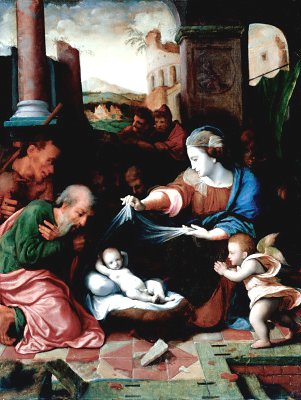 |
|
NATIVITY
Cornelis van Cleve Early Netherlandish
1520-1574
SN 201 Oil on Panel About 1540
by Robert Anderson
ARTIST
Cornelis was the son of the illustrious Antwerp artist, Joos van Cleve,
with whom he collaborated in his father's last years. The influence of Italian artists
suggests that he visited Italy in his youth, however, reliance on Italian art was
representative of much Flemish painting by 1540. Cornelis was not very successful in
Antwerp and emigrated to England in 1555 where he attempted to establish himself as a
portraitist. Failing in this he became insane and was returned to Antwerp to the custody
of his son.
Cornelis'works date from 1540 to 1555 and include devotional scenes -
mostly for private use, such as "Virgin and Child" and the "Adoration of
the Magi". His work does adhere closely to the same northern renaissance and
manneristic tendencies as that of his father, Joos van Cleve but his colors are more
mettalic and brilliant.
SUBJECT
The subject is the unveiling of the Christ child by Mary, his mother. |
PAINTING
This Ringling painting, set in some grandiose ruins, is a mature work
of the artist as it accords with other paintings that belong to Cornelis' late activity (
ie. "Adoration of the Shepherds" and "A Virgin and Child"). It is a
paraphrase of a painting executed by Raphael's studio around 1510 ( " Madonna of the
Diadem").
"Nativity" achieves a striking originality, however, thru the
Virgin's pearlescent flesh tones and the languorous Christ child. The Madonna is beautiful
and serene and the Christ child amusingly self confident. It is apparant from the noble
profile of Mary that Cornelis fully comprehended the discipline of Raphael as well as
Leonardo's palette and sfumato, or haze, which softens the contours.
HISTORICAL CONTEXT
This was a period of great tension in Northern Europe due to the
Protestant Reformation and it's attacks upon the Catholic Church. Antwerp was a Catholic
area under the control of Spain and the Protestant leanings of Cornelis - living in
Antwerp - might well have been a reason for his lack of success in Antwerp and his
emigration to England as well as, indirectly, his mental illness.
ringlingdocents.org
|